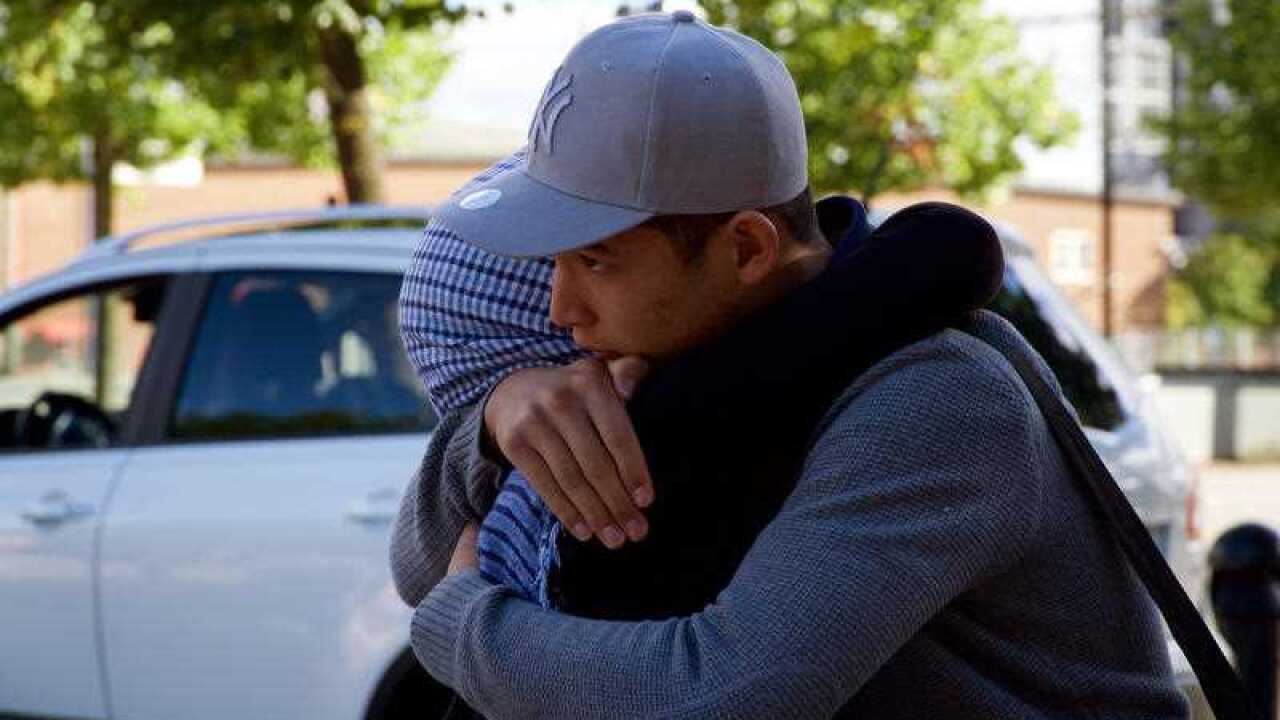Luck reunited the Azizi family at a concert in Sweden, a year after a dark night in a Turkish forest separated 14-year-old Mahdi Azizi from his parents and sisters.
Nader Azizi had spent anguished months seeking information about his son's fate, not knowing if Mahdi was alive or if he also made it to Sweden.
Nader recalled the moment he first thought he saw his son at the open air concert in central Sweden, telling himself it was just a dream as he strained to keep sight of the youth in the crowd.
He pushed closer and shouted out his son's name.
Mahdi turned around and exclaimed "Baba!", the Farsi word for dad.
The chance father-and-son reunion at a small town racetrack, along with a warm welcome from Mahdi's Swedish foster family, offers a bright spot amid the bleak stories emerging from the migrant crisis. After joining the waves of Syrian refugees pinning their hopes on human smugglers, Mahdi got split up from the rest of his family in Turkey during the rush to board a truck headed for the border.
After joining the waves of Syrian refugees pinning their hopes on human smugglers, Mahdi got split up from the rest of his family in Turkey during the rush to board a truck headed for the border.

Mahdi Azizi wipes a tear from his mother's eye prior to him boarding a bus to return to a centre for unaccompanied minors, in Vasteras, Sweden. Source: AAP
The boy travelled thousands of kilometres under the watch of different smugglers.
He managed to reach Sweden, unaware his family was at an asylum centre less than 150 kilometres (93 miles) away from the foster home where he was placed.
Mahdi said of his first days alone in the country that he was "really confused" and was crying himself to sleep thinking of his mother.
Nader had moments during their year-long separation when he felt confident he would see his son again, others when he feared the worst.
Mahdi's mother, Raheleh Azizi, 34, at first didn't believe her husband when he called to tell her their son was safe and only moments away.
She said she paced around the family's room at the asylum centre, not daring to believe the news.
Then, Mahdi knocked on the door and she was finally able to embrace her son again.
What triggered the Azizis' journey was an old family feud that began in their native Afghanistan.
Nader and Raheleh fell in love as teenagers, while he was working as a servant in her wealthy family's home.
Her family opposed the relationship, so the young couple ran away together.
Relatives physically attacked and made repeated death threats against the pair over the course of their marriage, believing Raheleh had dishonoured her family, Nader said.
Family members continued to pursue them, with the aid of the tight Afghan community in Iran, even after they moved with their two oldest children to Tehran a dozen years ago.
Nader said he decided his family needed to leave the region when the threats turned to kidnapping the children.
The family sold their belongings and gave 40,000 euros ($US44,000) last year to smugglers who promised to take them from Iran to Sweden.
Asked about the night Mahdi got left behind in the woods, son and father are overwhelmed by painful memories.
Nader was carrying his younger daughter, a toddler at the time, and thought his son was following just behind.
While describing how he called out his son's name in the confusion after the separation, Nader breaks off the story to compose himself.
Mahdi boarded another truck and eventually was pushed onto a boat for the crossing to Greece.
Forced to keep moving, the boy said he could not get anyone to understand or care that he wasn't supposed to be by himself.
Last year, more than one million migrants reached Europe by sea, and a further 34,000 have crossed from Turkey into Bulgaria and Greece by land.
After Germany, Sweden was the top destination for asylum-seekers entering Europe last year, with a record 163,000 people pursuing shelter there.
Mahdi was among the 35,369 unaccompanied minors to arrive in the welcoming Nordic nation.
He quickly was placed with a Swedish foster family.
His guardian, Carina Arnberg, took Mahdi and two other boys she and her husband were caring for to the July 29 concert at a racetrack about an hour's drive from her home. Little could she have imagined that Mahdi's family was living nearby, or that his father would stop to listen to the music of a Swedish pop duo at the racetrack.
Little could she have imagined that Mahdi's family was living nearby, or that his father would stop to listen to the music of a Swedish pop duo at the racetrack.

The Azizi and the Arnberg family eat lunch, in Vasteras, Sweden. Source: AAP
Arnberg gets goosebumps when she talks about how the stars aligned that day.
One of the boys she was chaperoning pointed to a tree other children had climbed for a better view.
She said Mahdi turned around to look at the tree and saw his father, just metres behind him.
Arnberg and her husband invited the rest of the Azizis to stay in a cottage next to their home.
There, Mahdi reconnected with his sisters - three-year-old Ghazal, who had forgotten him during his long absence, and 12-year-old Parvaneh.
But the happy ending is not yet complete.
Although Sweden is known for its welcoming attitude to immigrants, legislators tightened regulations for asylum and family reunification in January to help manage the growing flow from the Middle East.
As an unaccompanied minor who has been granted asylum, Mahdi, now 15, lives at an apartment provided by the Swedish government.
However, his parents' and sisters' applications were rejected on the grounds that they could live safely in Afghanistan.
They are appealing, but if forced to leave, hope another country will take the whole family.
In the meantime, Mahdi had to return to school a six-hour bus ride away this month, interrupting their reunion.
Watching his son leave, Nader said he did not know when they would be able to see him again.
But for a few strange and joyful days at the end of the short Scandinavian summer, just knowing Mahdi was safe was enough.











